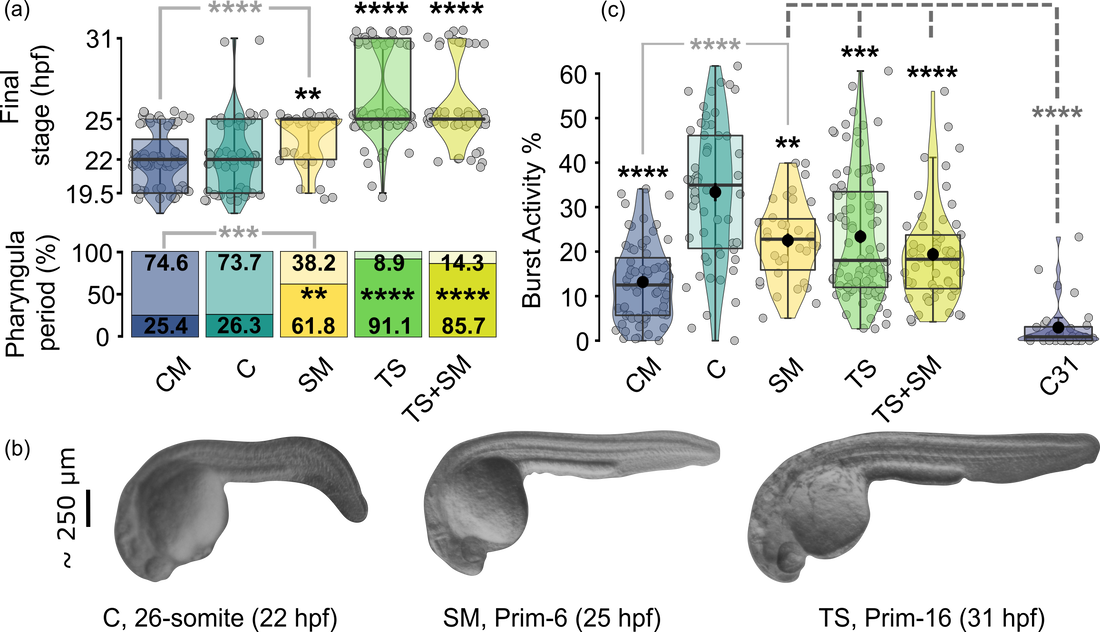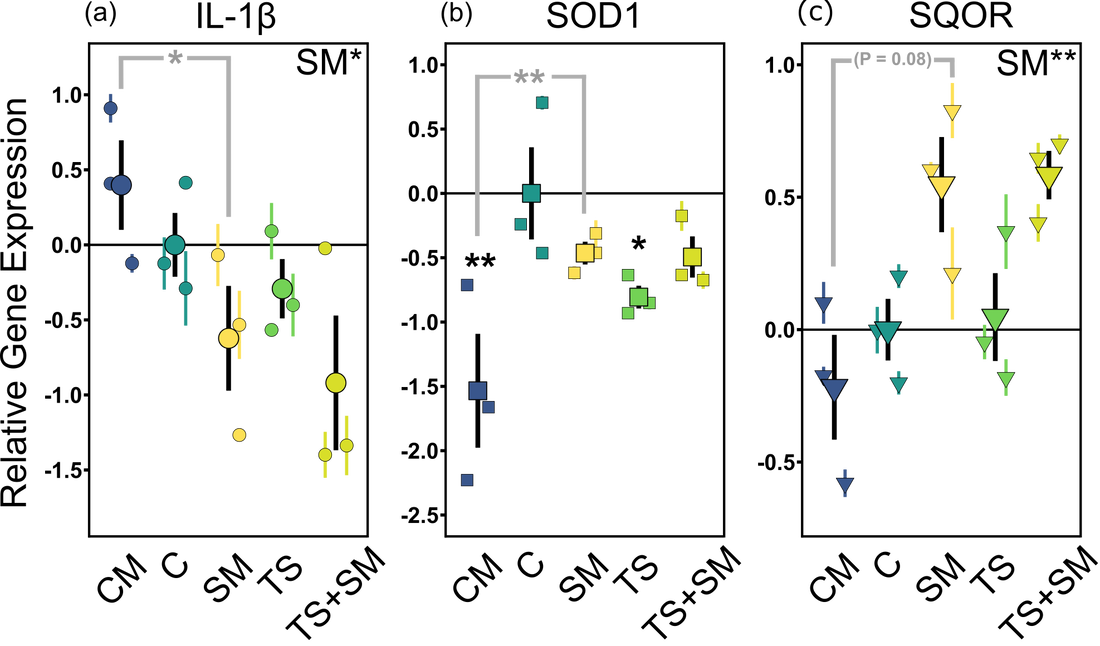heat stress can be propagated to othersPosted by: Lauric Feugere Organisms in the aquatic environment must cope with an array of stressors induced by climate change. There is now unequivocal evidence for human-induced warming of the climate with widespread and rapid changes already being observed [1] – for instance, this July 2021 was the hottest ever recorded [2] and oceanic temperature reached new record highs during the last two years [3]! End-of-century climate will be characterised by more thermal variability and more frequent extreme heat waves of longer duration, extent, and magnitude [1]. Such alterations of the thermal environment are of prime concern since temperature is the abiotic “ecological master factor” [4] that regulates the biology of ectotherms such as fish. Another matter of concern is that early developmental stages are more vulnerable to stressors, which can negatively and irreversibly affect them. Lots of research has shown that upon predation stress, fish can alert their neighbours through chemical communication involving chemical "disturbance cues" [5]. Part of the mission of our MolStressH2O research cluster was to find out, whether heat also has the potential to induce such stress communication. In this case, heat would induce a stress response in zebrafish embryos directly exposed to heat (“donors”), which in turn signal their state of distress to others (“receivers”) not exposed to heat. If receiver embryos activate a stress response themselves, this can be considered a “positive feedback loop” (see Figure 1). The potential cues were dubbed "stress metabolites" and the treatment "stress medium". We only found two prior studies suggesting that such mechanisms exist - in heat-stressed crayfish [6] and pH-stressed adult zebrafish [7] – but it may occur even in plants [8]. Figure 1. Concept of stress propagation and positive feedback loops. Upon stress, donors experience a stress response, in turn releasing “stress metabolites” that can trigger a similar stress response in naïve receivers. Our own study, which has now been published (link below), showed that heat-stressed zebrafish embryos grew faster (Figure 2a-b), moved less (Figure 2c), and had marginally lower gene expression of the antioxidant gene SOD1 (Figure 4b), but higher heat shock protein HSP70 than the control. These results were expected, as accelerated growth under heat is already known from ectotherms. Figure 3. Heat stress and stress medium accelerate the growth (a, illustrated in b) and alter the behaviour (c) of zebrafish embryos. C: control medium, C: control, SM: stress medium, TS: thermal stress, C31: positive control embryos after 31 hours post fertilisation (hpf). Asterisks show significant differences compared to C (no lines) or to group of interest (shown by lines). But our most important finding was that embryos incubated in stress medium/metabolites of a previously heat-stressed embryo, also displayed a stress response. Growth changed similarly to that of embryos under heat treatment, and so did behaviour (Figure 2). However, the gene expression patterns differed as stress medium suppressed the immune response-related gene interleukin-1β (IL-1β) but activated the antioxidant response gene sulfide:quinone oxidoreductase (SQOR), another known but little-studied marker of thermal stress [10]. Figure 4. Repeated thermal stress lowers the gene expression of superoxide dismutase 1, whereas stress medium alters the gene expression of interleukin-1β and sulfide:quinone oxidoreductase and shows different patterns than control medium. CM: control medium, C: control, SM: stress medium, TS: thermal stress. “SM*” in the top right corners indicate significant effect. Asterisks show significant differences compared to C. Our results confirm the hypothesis that at least some of the effects of stress can be propagated to naïve receivers through means of chemical communication. We are currently doing further studies using high-throughput techniques, so called “omics”, which will help to better characterise the stress metabolites responsible for the stress propagation, and the molecular pathways they activate in the receivers. In conclusions, our study shows that heat stress does not just directly affect animals, but that there are also indirect mechanisms that can act as amplifiers of the heat stress response. Our results broaden the concept of stress communication to include abiotic stressors and may help to model the fate of populations and communities in an era of climate change. Read the paper (pdf is available on Researchgate or upon request) Feugere, L., Scott, V. F., Rodriguez-Barucg, Q., Beltran-Alvarez, P. & Wollenberg Valero, K. C. Thermal stress induces a positive phenotypic and molecular feedback loop in zebrafish embryos. J. Therm. Biol. 102, 103114 (2021). https://doi.org/10.1016/j.jtherbio.2021.103114 References
1. Zhai, P. et al. Climate Change 2021: The Physical Science Basis. Contribution of Working Group I to the Sixth Assessment Report of the Intergovernmental Panel on Climate Change (2021). 2. It’s official: July was Earth’s hottest month on record. https://www.noaa.gov/news/its-official-july-2021-was-earths-hottest-month-on-record. 3. World Meteorological Organization. WMO Statement on the state of the Global Climate. (2021). 4. Brett, J. R. Energetic responses of salmon to temperature. A study of some thermal relations in the physiology and freshwater ecology of sockeye salmon (Oncorhynchus nerkd). Am. Zool. 11, 99–113 (1971). 5. Barcellos, L. J. G., Volpato, G. L., Barreto, R. E., Coldebella, I. & Ferreira, D. Chemical communication of handling stress in fish. Physiol. Behav. 103, 372–375 (2011). 6. Hazlett, B. A. Disturbance pheromones in the crayfish Orconectes virilis. J. Chem. Ecol. 11, 1695–1711 (1985). 7. Abreu, M. S. et al. Behavioral responses of zebrafish depend on the type of threatening chemical cues. J. Comp. Physiol. A Neuroethol. Sens. Neural Behav. Physiol. 202, 895–901 (2016). 8. Falik, O., Mordoch, Y., Quansah, L., Fait, A. & Novoplansky, A. Rumor has it…: Relay communication of stress cues in plants. PLoS One 6, e23625 (2011). 9. Feugere, L., Scott, V. F., Rodriguez-Barucg, Q., Beltran-Alvarez, P. & Wollenberg Valero, K. C. Thermal stress induces a positive phenotypic and molecular feedback loop in zebrafish embryos. J. Therm. Biol. 102, 103114 (2021). 10. Wollenberg Valero, K. C. et al. Functional genomics of abiotic environmental adaptation in lacertid lizards and other vertebrates. J. Anim. Ecol. (2021) doi:10.1111/1365-2656.13617.
0 Comments
Leave a Reply. |
Details
Kat / other membersWe'll update you on news from our research and other related activities Archives
March 2022
Categories |




 RSS Feed
RSS Feed
